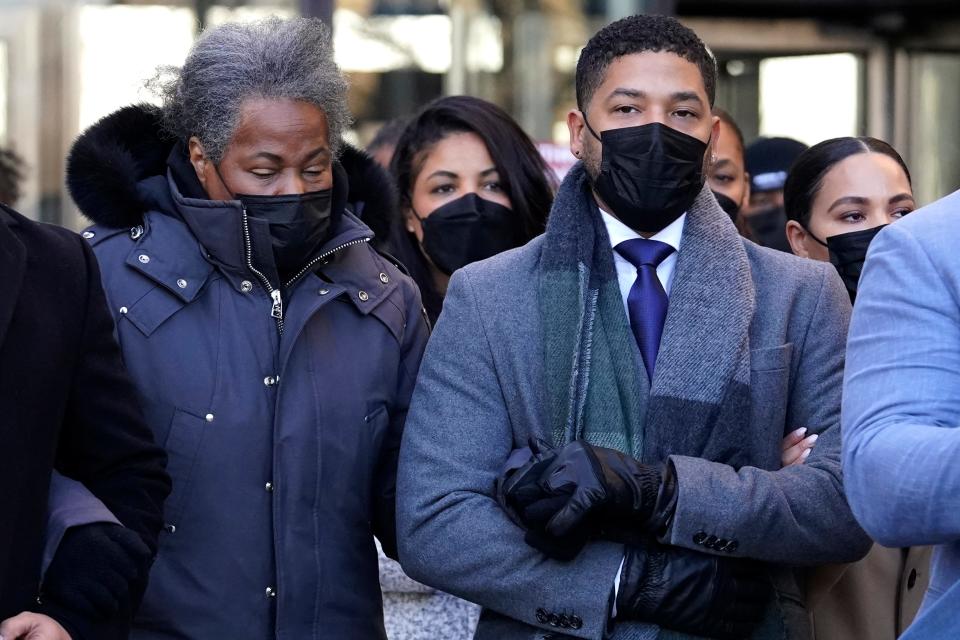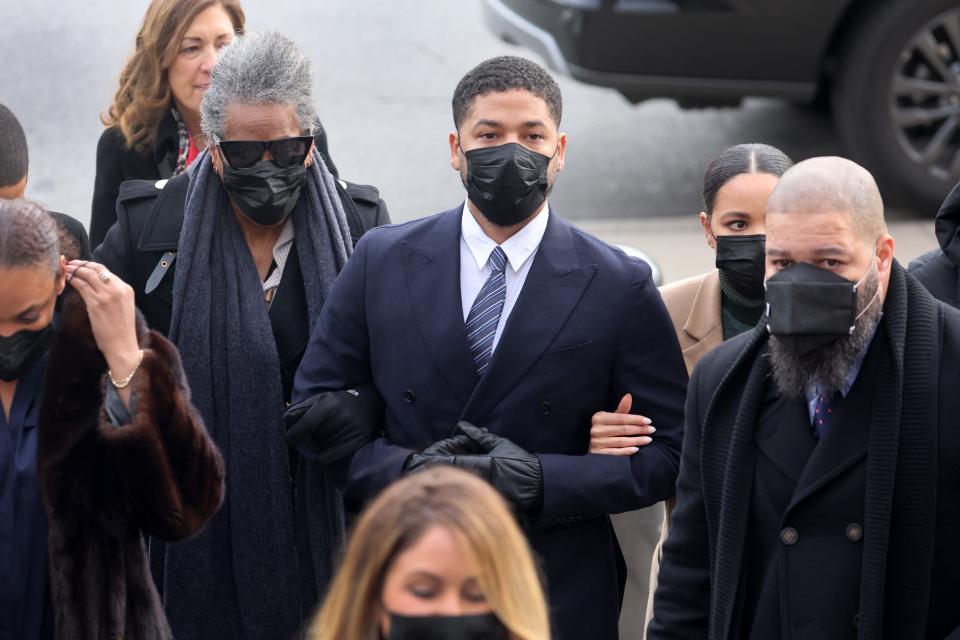Jussie Smollett found guilty of 5 counts of staging racist, anti-gay attack in Chicago, lying to police
A jury found ex-"Empire" actor Jussie Smollett guilty Thursday of five of six counts of felony disorderly conduct in Chicago after a one-week trial.
In the courtroom as the verdict was read, Smollett stood and faced the jury, showing no visible reaction.
The 39-year-old was found guilty on five counts of disorderly conduct — one count for each separate time he was charged with lying to police in the days immediately after the alleged attack. He was acquitted on a sixth count, of lying to a detective in mid-February, weeks after Smollett said he was attacked.
Smollett was released Thursday and Judge James Linn set a post-trial hearing for Jan. 27. He said he would schedule Smollett's sentencing at a later date.
Disorderly conduct is a class 4 felony that carries a sentence of up to three years in prison, but experts say he likely will be placed on probation and perhaps ordered to perform community service.
After the verdict was read, Smollett's attorney, Nenye Uche, said Smollett would appeal the conviction. Uche told reporters Smollett is “100% innocent.” He said Smollett’s team is confident “he’s going to be cleared of all, all accusations on all charges.”
“Unfortunately we were facing an uphill battle where Jussie was already tried and convicted in the media and then we had to somehow get the jury to forget or unsee all the news stories that they had been hearing that were negative for the last three years,” Uche said.
Jussie Smollett timeline: A look back at the ex-'Empire' star's alleged attack, hoax claims

From 2019: 'Empire' star Jussie Smollett: Attackers yelled, 'This is MAGA country' during beating
Outside court, special prosecutor Dan Webb called the verdict “a resounding message by the jury that Mr. Smollett did exactly what we said he did.”
Smollett "wreaked havoc here in the city for weeks on end for no reason whatsoever," then compounded the problem by lying under oath to the jury, Webb said.
“A lot of times people say, ‘Well, police officers sweep things under the rug.’ This police department responded by absolutely testifying in this trial that they took it seriously," Webb said. "They believed he was a victim of a crime and they worked so hard for the next three weeks.”
The damage to Smollett's personal and professional life has already been severe. Smollett lost his role on the TV program “Empire” after prosecutors said the alleged attack was a hoax, and he told jurors earlier this week that “I’ve lost my livelihood.”
The jury deliberated about nine hours Wednesday and Thursday after a trial in which brothers Abimbola and Olabinjo Osundairo testified that Smollett recruited them to fake the attack near his home in downtown Chicago in January 2019. They said Smollett orchestrated the hoax, telling them to rough him up in view of a surveillance camera, and that he said he wanted video of the hoax made public via social media.
More: Will Jussie Smollett testify in Chicago trial? Legal experts weigh in

The jury began deliberating Wednesday after hearing closing arguments from special prosecutor Webb, who told the jury that what Smollett did caused Chicago police to spend enormous resources investigating an alleged crime that turned out to be fake. Smollett, who is Black and gay, told police someone put a noose around his neck and yelled racist and homophobic slurs.
“Besides being against the law, it is just plain wrong to outright denigrate something as serious as a real hate crime and then make sure it involved words and symbols that have such historical significance in our country,” Webb said.
Defense attorney Uche said in his closing argument that the brothers are “sophisticated liars,” adding that during testimony last week one of the brothers “said ‘I don’t recall’ so many times, it is ridiculous.”
“The entire prosecution’s case, including the foundation of the case, is built like a house of cards,” Uche said.
Asked Thursday if Smollett could be charged with perjury for lying on the witness stand, Webb said perjury charges “generally” don’t happen after a defendant is convicted, but that it was unclear what would happen in Smollett's case.
Gloria Rodriguez, the attorney for the Osundairo brothers, said her clients “could not be more thrilled and pleased with the results."
Chicago police “got this one right,” Rodriguez said.
The actor's trial began Nov. 29, nearly three years after Smollett reported to police that he was the victim of a racist and homophobic attack.
Jurors resumed deliberations Thursday morning after having the case for about two hours on Wednesday, when they also asked Judge James Linn for a copy of a calendar prosecutors displayed at trial. It indicated relevant dates, including that of the alleged attack and of what two brothers testified was a “dry run” for the Jan. 29, 2019, assault.
The jury had not asked any additional questions as of Thursday afternoon.
Background: Jussie Smollett indicted on new charges over alleged Chicago attack; attorney responds
From 2019: Anti-LGBT hate crimes are rising, the FBI says. But it gets worse

Prosecutors’ case against Smollett focused on how Chicago police say they determined that what they initially believed was a horrific hate crime was actually a fake assault staged by the actor with help from brothers Abimbola and Olabinjo Osundairo.
Smollet's attorney Uche argued that Smollett was a "real victim" of a "real crime." His defense tried to discredit the brothers, saying they lied about Smollett staging the attack to get out of trouble for possessing the firearms and heroin that was found when police searched their home after the alleged attack.
Throughout the trial, jurors heard testimony from Smollett and both Osundairo brothers, whom Smollett called "liars."
Asked by his defense attorney if he gave Abimbola Osundairo payment for some kind of hoax, Smollett replied on the stand: “Never."
"There was no hoax," Smollett said.
Defense attorneys have suggested the Osundairo brothers were motivated to accuse Smollett of staging the hoax because they disliked him and saw an opportunity to make money. They suggested that after the brothers were questioned by police about the alleged attack, they asked Smollett for $1 million each to not testify against him at trial.
Abimbola Osundairo said Smollett ordered he brothers “to fake beat him up” and instructed them on how to carry out the attack in January 2019.
Olabinjo Osundairo’s testimony at Smollett’s trial in Chicago echoed the account his brother gave, including that Smollett wanted the brothers to douse him with gasoline and put a noose around his neck, and that Smollett gave them a $100 bill to buy the supplies and paid them with a $3,500 check.

Jurors also heard testimonies from officers like Chicago police detective Kimberly Murray, who said that Smollett appeared "upset" when he was told that a surveillance camera did not record the alleged assault because it was pointed away from the scene. Murray said she explained to the actor that the cover on the pod camera makes it impossible to know which way it is pointing.
Murray, who interviewed Smollett the morning of the attack, said he told her he had received a threatening phone call days earlier, but he refused to hand over his cellphone, which the detective said could help police piece together a timeline of what happened, and he wouldn’t consent to giving medical records or a DNA swab.
Smollett's attorney Uche said in the defense's opening statement that Abimbola and Olabinjo Osundairo attacked Smollett because they didn't like him and that a $3,500 check the actor paid the men was for training so he could prepare for an upcoming music video – not as payment for staging a hate crime.
Uche also suggested a third attacker was involved and told jurors there is not a "shred" of physical and forensic evidence linking Smollett to the crime.
More: Josh Duggar found guilty of receiving and possessing child pornography
Contributing: Maria Puente, Hannah Yasharoff, Jayme Deerwester and Pamela Avila, USA TODAY; The Associated Press
This article originally appeared on USA TODAY: Jussie Smollett trial verdict: Actor found guilty of staging attack
